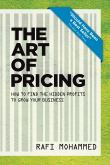How to Save Groupon
Reprinted from the Harvard Business Review website.
After recently getting lost for the umpteenth time, I decided to join the 20th century and purchase a GPS navigation device. Shortly after making this decision, Groupon delivered a great deal to my email inbox: a factory refurbished Garmin GPS ($240 list price) for $69. A day or so later, ready to purchase, I went to the Groupon web site only to discover that over 25,000 GPS units had been sold and the deal was no longer available. Wow, I thought: That's a lot of GPSs to move in a short period.
Success stories like that have been in short supply lately for online discount sites like Groupon. In a little over a year, Groupon's stock price has fallen from a high of over $31 to under $4. Over the last month, founder Andrew Mason has faced repeated rumors that he may be ousted. Just last week, LivingSocial laid off 9% of its staff.
So what's causing this drastic demise? Many claim "consumer fatigue": consumers are tiring of deals. I doubt this, because consumers really love good deals. For proof of that, just ask J.C. Penney — its sales have nosedived by 27% primarily because the chain stopped offering weekly deals.
The real problem facing Groupon is "seller fatigue": merchants are finding they are not getting a positive return on their Groupon investment. Sure, mobs of customers show up armed with 50% off coupons, but few go on to become repeat customers once the discounts end. The daily discount site mantra to merchants of "get them in cheap and they'll return to pay full price" is fundamentally flawed. As long as deal sites keep promoting this party line, they'll continue to flounder.
So what should deal sites do? Acknowledge the truth and evolve. Their sizable subscriber bases (Groupon claims to have over 200 million subscribers with 39.5 million classified as "active") are a significant asset, even if those members aren't proving to be a great source of repeat customers for the bars, spas, and rock climbing centers that send out so many Groupons each week.
Instead of selling hope ("fingers crossed, you'll make a profit later"), Groupon needs to leverage its subscriber base and focus on creating opportunities for merchants to reap profits now. Have excess inventory to sell? Use Groupon Goods! After all, how many other sites can (and are willing to) simply push an email blast button and sell 25,000 refurbished GPS units in a day?
Deal sites are a great way to fill off-peak unused capacity too. Restaurants, for instance, are trying to use reduced prices to fill tables during off-peak time periods. Why not use a Groupon deal that is only good Monday — Wednesday before 7 PM? And to be clear, discounts don't have to be so drastic. One 25% off Groupon deal could profitably fill early bird slots at popular restaurants for the foreseeable future.
Restricting discounts to off-peak time periods or unsold leftovers also reduces the risk of tainting a company's brand. Customers understand the idea of filling spare capacity by lowering prices. They realize that a meal at 5:30 PM on Tuesday is not comparable to one on Saturday at 8 PM. If the Ritz Carlton can use discounts during off-peak times (for instance, during hurricane season in the Caribbean) without damaging its prestigious brand, your company probably can too.
It's time for Groupon to come clean on what many merchants have already discovered: its 200 million are mostly frugal people looking for deep discounts, not consumers looking to create long-lasting new relationships. Instead of promoting daily discounts as a vehicle to drum up profitable future business, Groupon should be selling excess goods and excess capacity. The smattering of customers who return and pay full price should be considered "gravy," not the primary goal of the promotion. By limiting quantities and redemption time periods, merchants also reduce the risk of being overwhelmed by crushes of customers.
Will this revised pitch/strategy return Groupon to its heady days of being the "fastest growing company ever"? It's unlikely. But since most companies have "excess opportunities," Groupon can become an integral and ongoing business partner.
So what do you think? Do you believe the "they'll come back and pay full price" pledge of deal sites? Should Groupon focus on "excess opportunities" that result in immediately profitable transactions for merchants? Does Groupon have the fortitude to change its strategy?




